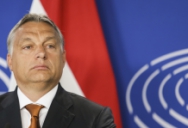Europe’s employment industry contributes to more inclusive, open and sustainable labour markets
S&Ds: International community must stop the slaughtering of Syrians. UN action can no longer be blocked
Rosa-Luxemburg-Stiftung, Brussels Office
The EU must live up to its values and put Roma issues at the heart of its political programme
ESA - European Society of Anaesthesiology
#EuropeTogether Hamburg: Time has run out - Let’s assume our responsibility and tackle migration and globalisation effectively for all!
Financial services see growing risks a year before Brexit, finds ACCA

UK financial services increasingly feel risks outweigh opportunities as Brexit draws nearer, according to the latest snapshot member survey by ACCA (the Association of Chartered Certified Accountants).
Almost half (49%) of representatives from FS firms surveyed by ACCA stated that the risks posed by Brexit are greater than the opportunities (compared to 14% who believed the opposite). Last year this negative imbalance was 40% to 16% respectively and this year it increased to 49% and 16% respectively.
The survey also found that the number of respondents making Brexit contingency plans has increased from last year. Yet over a third say they will have either little or no preparation plan in place by the time the UK formally leaves the EU in a year’s time.
At the same time, views are more balanced regarding the long-term impact of Brexit. One third (33%) expect that in five years’ time the opportunities will outweigh the risks, while 32% state the opposite.
Maggie McGhee, Director of Professional Insights at ACCA says,
‘While this is only a snapshot of the large and diverse FS sector, the findings reflect the views commonly heard from our membership. While the proposed transition deal means business as a whole has some degree of clarity, the race is now on to secure a favourable Brexit outcome for FS.
‘At the same, government should not lose sight of the long-term opportunities for Brexit. A favourable regulatory environment could benefit financial services if it facilitates improved relationships with the global economy.
‘Yet to achieve the right levels of cooperation and coordination with our European and global partners, the work has to start now.’
The second edition of Brexit impact on financial services is based on the views of 250 professional accountants working across the financial services sector: http://www.accaglobal.com/gb/en/professional-insights/global-economics/brexit-impact-on-financial-services-second-edition.html
- ends -
For media enquiries, contact:
David Bowden, ACCA Newsroom
T: +44 (0)20 7059 5019
M: + 44 (0)7540919819
E: david.bowden@accaglobal.com
Twitter @ACCANews
About ACCA
ACCA (the Association of Chartered Certified Accountants) is the global body for professional accountants, offering business-relevant, first-choice qualifications to people of application, ability and ambition around the world who seek a rewarding career in accountancy, finance and management.
ACCA supports its 200,000 members and 486,000 students in 180countries, helping them to develop successful careers in accounting and business, with the skills required by employers. ACCA works through a network of 101 offices and centres and more than 7,200 Approved Employers worldwide, who provide high standards of employee learning and development. Through its public interest remit, ACCA promotes appropriate regulation of accounting and conducts relevant research to ensure accountancy continues to grow in reputation and influence.
ACCA is currently introducing major innovations to its flagship qualification to ensure its members and future members continue to be the most valued, up-to-date and sought-after accountancy professionals globally.
Founded in 1904, ACCA has consistently held unique core values: opportunity, diversity, innovation, integrity and accountability. More information is here: www.accaglobal.com
CONSEIL DE COOPERATION DOUANIERE
Member states back S&D’s demand for equal pay for equal work
- Wages according to collective bargaining agreements
- Allowances such as a thirteenth salary, cold weather payments and other benefits
- The reimbursement of travel and accommodation costs, on top of the salary
- Change from home, to host labour law after 12 months with a possible extension of 6 months, instead of after 24 months as proposed by the Commission
Mark Zuckerberg must now testify in front of the European Parliament
Dieselgate and Facebook scandal show EU citizens need to be able to bring lawsuits collectively
EU glass packaging closed loop recycling steady at 74%
 Latest industry data on glass recycling show that the average glass recycling rate in the EU28 is steady at 74%. This means that over 11.6 million tons of glass bottles are collected, and recycled into food grade quality material for the production of new glass containers.
Latest industry data on glass recycling show that the average glass recycling rate in the EU28 is steady at 74%. This means that over 11.6 million tons of glass bottles are collected, and recycled into food grade quality material for the production of new glass containers.Decent work for all - S&Ds call for ban of zero-hour contracts in new rules on working conditions
VDMA: Mittelstand befürchtet Klagewelle durch EU-Sammelklagen

Brüssel/Frankfurt, 11. April 2018 – Die Einführung von Sammelklagen in der EU würde mittelständische Unternehmen zur Zielscheibe eines Klagesystems nach US-amerikanischem Vorbild machen. Für einen Irrweg hält der VDMA daher den aktuellen Vorstoß der Europäischen Kommission, Sammelklagen durch Organisationen und Interessensgruppen auch ohne Zustimmung der betroffenen Verbraucher zu ermöglichen. „Der Entwurf der Kommission lädt förmlich dazu ein, Unternehmen schon beim geringsten Verdacht mit einer Flut von Klagen zu überziehen“, warnt Christian Steinberger, Leiter der Rechtsabteilung des VDMA.
Kritisch sieht der VDMA den Vorschlag der Kommission, Kläger von Teilen der Prozesskosten wie etwa Gerichtsgebühren zu befreien. „Das finanzielle Risiko einer Sammelklage verlagert sich damit vor allem auf das beklagte Unternehmen. Damit wird dem Missbrauch Tür und Tor geöffnet“, sagt Steinberger. Das bewährte Prinzip der deutschen Prozessordnung, nach dem der Verlierer des Verfahrens auch die Kosten trägt, droht durch die EU-Sammelklage ausgehebelt zu werden. „Leidtragende wären vor allem kleine und mittlere Unternehmen, die sich aufgrund begrenzter Ressourcen und der Sorge vor Reputationsverlust keine langwierigen Verfahren leisten können und sich gegebenenfalls zu teuren Vergleichen gezwungen sehen. Das Beispiel der Sammelklagen in den USA zeigt dies deutlich“, warnt Steinberger.
Den Entwurf der Richtlinie zu EU-weiten Sammelklagen, den die Kommission im Rahmen des Gesetzespakets „New Deal for Consumers“ in Brüssel vorgestellt hat, geht damit noch weit über den aktuellen Entwurf einer Musterfeststellungsklage in Deutschland hinaus. Der VDMA verweist jedoch darauf, dass der Verbraucherschutz im Zivilrecht in Deutschland und der EU schon jetzt gut ausgebaut ist. Neue Klagemöglichkeiten würden daher kaum zu mehr Verbraucherschutz beitragen, dafür aber unverhältnismäßige Risiken für Unternehmen schaffen.
Der VDMA vertritt mehr als 3.200 Mitgliedsunternehmen des mittelständisch geprägten Maschinen- und Anlagenbaus. Mit 1,35 Millionen Erwerbstätigen im Inland und einem Umsatz von 224 Milliarden Euro (2017) ist die Branche größter industrieller Arbeitgeber und einer der führenden deutschen Industriezweige insgesamt.
Europe must do more to get child refugees back to school, a new study reveals
New consumer rights must be "effective, practical and proportionate"
ECR Internal Market co-ordinator Daniel Dalton MEP today welcomed the European Commission's New Deal for Consumers.
Mr Dalton, who will pilot proposals through the European Parliament as a rapporteur, said:
"It is good to see the Commission coming forward with ideas to address problems exposed by issues such as the vehicle emissions scandal, the lack of transparency in some online sales and the 'dual food' question.
"Our task now is to ensure the Parliament produces legislation that is effective, practical and proportionate. That will take time and we must not allow the Commission's desire to complete the process before the elections in May 2019 override the need to get this right."
The proposals, unveiled today, aim to strengthen consumer rights online, introduce class actions led by consumer organisations, tackle the practice of branded food products containing different ingredients in different markets, and remove unnecessary burdens on businesses.
Mr Dalton's separate report introducing new testing measures to prevent a repeat of the emissions scandal are expected to be approved by the Parliament next week.
ENDS
Contact: Robert Taylor, robert.taylor@ep.europa.eu, +32 498 984 760
For a list of all ECR Press Officers go to (scroll down): http://ecrgroup.eu/contacts/
The ECR was created to take the EU in a new direction, according to the principles of our founding Prague Declaration. It is the third largest group in the European Parliament with 71 MEPs from 18 EU states.
For more information on the ECR, watch our promotional video at http://youtu.be/F5syQt1JuQI or visit our website: www.ecrgroup.eu
Ambitious 8 GW of offshore wind planned that will put Poland back on wind energy map
 BRUSSELS, 11 APRIL 2018 – State-owned Polish Transmission System Operator, PSE, has said that as much as 8 GW of offshore wind capacity could be installed in Poland.
BRUSSELS, 11 APRIL 2018 – State-owned Polish Transmission System Operator, PSE, has said that as much as 8 GW of offshore wind capacity could be installed in Poland.
PSE President Eryk Kłosowski said that 4 GW of offshore wind could be installed in the Polish Baltic Sea by 2026/27 with up to 8 GW in the longer term.
Poland has become a major player in the offshore wind supply chain in recent years with major investments in the manufacturing of turbine foundations and the cranes and jack-up vessels used in installation and maintenance. The Polish wind industry now supports 12,000 jobs. This number would grow significantly with the development of a domestic offshore wind market.
WindEurope CEO Giles Dickson said:“This commitment to help kick-start the Polish offshore wind market is excellent news. After a period of stagnation in onshore wind, it will put Poland back on the European wind energy map. It’ll help diversify Poland’s energy mix and it’ll support further growth and job creation in Poland’s successful offshore wind supply chain. The skills and industrial expertise needed to meet these volumes is in place. It’s great the TSO has confirmed that the Polish electricity grid can support them too. The Baltic Sea offers enormous growth potential for offshore wind and it’s very good to see that Poland is gearing up to play its part in fulfilling that”.
According to Janusz Gajowiecki, President of the Polish Wind Energy Association (PWEA): “Today Polish companies could deliver up to 50% of the components required to build offshore wind farms. PWEA has identified almost 80 companies that could deliver the necessary products and services, starting from offshore wind farm design and planning, production and installation of turbine components and connection infrastructure, to offshore wind farm operation and maintenance”.
ENDS
Note to Editors:
WindEurope is the voice of the wind industry, actively promoting wind power in Europe and worldwide. We have over 450 members, active in over 50 countries. In addition to wind turbine manufacturers with a leading share of the world wind power market, our membership encompasses component suppliers, research institutes, national wind and renewables associations, developers, contractors, electricity providers, finance and insurance companies, and consultants.
For additional questions, please contact:
Andrew Canning, WindEurope Press & Communications Manager, andrew.canning@windeurope.org
+32 2 213 18 67
Global standards more important than ever, asserts ACCA as it supports new IFAC and BIAC study
 ACCA (the Association of Chartered Certified Accountants) is supporting the findings of a must-read new study from IFAC (International Federation of Accountants) and Business at OECD (BIAC) called Regulatory Divergence: Costs, Risks, Impacts: An International Financial Sector Study.
ACCA (the Association of Chartered Certified Accountants) is supporting the findings of a must-read new study from IFAC (International Federation of Accountants) and Business at OECD (BIAC) called Regulatory Divergence: Costs, Risks, Impacts: An International Financial Sector Study.
The study says that fragmentation in global financial regulation costs more than USD $780 billion annually, and looks at regulatory divergence by taking the pulse of more than 250 regulatory and compliance leaders from major global financial institutions.
The findings reinforce the impact of fragmented regulation - from tangible economic costs, financial risks and barriers to economic growth. It also offers recommendations for the future in what the report calls “actionable steps to curb the impacts of financial regulatory divergence” – from “aligning regulatory definitions to enhancing transparency in rule making, monitoring, and enforcement processes.”
Sundeep Takwani, director – regulation at ACCA says: ‘We wholeheartedly back the Business at OECD (BIAC) and IFAC’s calls to enhance international cooperation among regulators, increase overall alignment in regulation, and ensure clarity in international rule-setting to repair regulatory fragmentation.’
‘ACCA believes that adherence to global standards and regulations best serve the public interest and in the promotion of sustainable global business practices.
‘For ACCA, standards and regulation must be about delivering public value and work in the public interest, without being onerous for business. This is an insightful report for CFOs and risk managers, but it’s also relevant to the global profession as a whole.’
- ends -
For media enquiries, contact:
Helen Thompson
E: Helen.Thompson@accaglobal.com
T: +44 (0)20 7059 5759
M: +44 (0)7725 498 654
Twitter @ACCANews
About ACCA
ACCA (the Association of Chartered Certified Accountants) is the global body for professional accountants, offering business-relevant, first-choice qualifications to people of application, ability and ambition around the world who seek a rewarding career in accountancy, finance and management.
ACCA supports its 200,000 members and 486,000 students in 180 countries, helping them to develop successful careers in accounting and business, with the skills required by employers. ACCA works through a network of 101 offices and centres and more than 7,200 Approved Employers worldwide, who provide high standards of employee learning and development. Through its public interest remit, ACCA promotes appropriate regulation of accounting and conducts relevant research to ensure accountancy continues to grow in reputation and influence.
ACCA is currently introducing major innovations to its flagship qualification to ensure its members and future members continue to be the most valued, up to date and sought-after accountancy professionals globally.
Founded in 1904, ACCA has consistently held unique core values: opportunity, diversity, innovation, integrity and accountability. More information is here: www.accaglobal.com


















